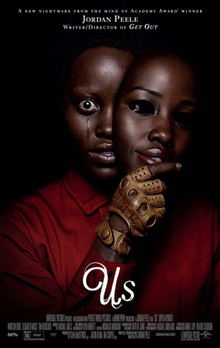Us: Ambition Lacking Focus

Jordan Peele’s latest visionary film, Us, plays with complex themes of duality, oppression, and revolution in the midst of a horror-filled plot.
April 28, 2019
The latest ambitious project from Jordan Peele, Us, broke box office records in its opening weekend last March, claiming its place as the highly anticipated follow-up to his Academy Award-winning Get Out. In many of the same ways that its predecessor broke new ground, Us uses its medium as a disturbing psychological thriller to provide commentary on the racial tensions and prejudice that continue to haunt America; Peele continues his tradition of reinventing the horror genre for a greater purpose than simple jumpscares. But even beyond that deeper meaning that haunts you long after the movie finishes, Us keeps the audience constantly entertained with edge-of-your-seat horror, strong, likeable characters, and an intriguing narrative that keeps even the most casual of viewers happy.
Us follows Adelaide Wilson and her family on their summer vacation to the beachfront home she grew up in. All is not as well as it initially seems, and Adelaide is constantly haunted by a traumatic, mysterious childhood incident at the very same boardwalk she has now come back to. As stranger and stranger happenings begin to occur, she becomes more fearful for her and her children’s safety, until a family of doppelgangers shows up at their front door, unnaturally humanoid and brandishing each a pair of golden sharp scissors. The havoc, horror, and murder that follows their arrival, gripping and tantalizing, peaks at a final confrontation between Adelaide and her Tethered twin, Red, and the final reveal of what happened that dark night of her childhood.
Jordan Peele’s latest finds itself much larger than Get Out’s confined and contained narrative – more grandiose, more ambitious, more imagined and intensely creative. The driving force of that ambition is clearly realized in the final product, but Us doesn’t quite hit the mark as well as Get Out was able to. Without many spoilers, the inner meaning is almost too muddled in the intricacies of the plot and too broad a scope to be contained within a single two hour movie; it’s trying too much with too little time. Despite that, the talent that made Get Out a stand-out classic still stands strong behind Us. Peele’s attention to detail is found in every frame, whether that be classic 80s easter eggs or often missed narrative foreshadowing (such as how the title Us can just as easily be interpreted as US, the country). Much like its predecessor, Us was designed best to be viewed multiple times, to look for the dialogue cues and set details hinting at future events that are most obvious after already seeing the ending once. Standing up to this scrutiny is something that few movies can claim, much less encourage, and Us remains one of the few unique films that do so.
In terms of horror, the R rating seems to be thoroughly justified. While Get Out was only psychologically unsettling until the gory finale, Us instead jumps the gun and becomes violent incredibly quickly. In that way, the movie is far more frightening, but also due to the nature of the violence – this is an American family, threatened by murderous doppelgangers, and the relatability of the characters and their intensely likeable personalities makes the threat to their lives sudden more realized. Their horror seems incredibly real on screen, and that makes for a nail-biting, shaking experience when watching.
For fans of Get Out, Us is certainly worth the watch. While it doesn’t manage to quite reach the same heights that Get Out reached, fans will enjoy Peele’s continued subversion of horror tropes, and in the cinema the experience of watching certainly upholds to the high standards set before it. I certainly enjoyed my time spent in its world, the way the film asks you to think about what it really means and makes you feel smart about it, and especially the twist ending that left me both dazed and screaming “I knew it!” at the same time. For that reason I know I’ll be hotly anticipating to see the next story from Jordan Peele’s mind.





